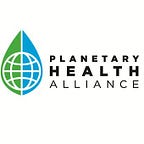Sam Wanjohi Spotlights Paul Auerbach
By Sam Wanjohi, Travel Scholar and Speaker Ambassador at the 2019 Planetary Health Annual Meeting
“I am wearing a maroon (Stanford colour), Columbia short sleeve shirt, and tan khaki-style pants with brown Scarpa shoes. Grey hair — old man.” This humorous description of himself served to put me at ease and is how I met my mentor, Dr. Paul S. Auerbach.
Dr. Auerbach is the Redlich Family Professor Emeritus in the Department of Emergency Medicine at the Stanford University School of Medicine and Adjunct Professor of Military/Emergency Medicine at the F. Edward Hébert School of Medicine of the Uniformed Services University of the Health Sciences. He is co-author of Enviromedics: The Impact of Climate Change on Human Health, editor of the textbook Wilderness Medicine, and author of Medicine for the Outdoors. Dr. Auerbach is also founder of the Wilderness Medical Society. He believes in trying to make the world a better place and in inspiring trust.
He attended Duke University for both his Bachelor of Arts in religion and Doctorate of Medicine. He undertook his clinical internship at the Dartmouth Hitchcock Medical Center, completing in 1978. In 1980, Dr. Auerbach undertook a residency in emergency medicine at the University of California, Los Angeles Medical Center, becoming board certified in emergency medicine by the American Board of Emergency Medicine in 1981.
While working on an American Indian reservation in Montana during medical school in 1975, Dr. Auerbach saw many wilderness medicine-related problems that spurred his interest in the field of study that he would later write about and be renowned for.
Dr. Auerbach observes that the worsening health of our environment means worsening human health. As a clinician, he has, on many occasions, seen the actual impacts of environmental degradation on human health, including global warming and climate change. He has first-hand experience on how various factors, including globalization, influence planetary health. These he has detailed in his book.
He observes that whereas developing nations have higher capacities to buffer themselves against the vagaries of weather, the world would be, in the least, very uncomfortable for them. On the other hand, developing nations, highly vulnerable to the impacts of environmental degradation, would be severely affected and suffer multifactorial consequences, including death. Coming from a developing country in Africa, I am well aware of what he was referring to, including the challenges faced by communities in Sub-Saharan Africa (for instance, land degradation and extreme weather conditions, resulting in malnutrition, emerging and re-emerging diseases, water sanitation, and hygiene challenges, among others).
During our discussions, Dr. Auerbach described several scenarios where he participated in responding to natural disasters and other conditions attributed to climate change, both within the United States and beyond. He shared his first responder/frontline experiences to the disasters in Haiti and Nepal, among others (including sharing the photo of himself below).
He also highlighted a case where he was called in to handle a patient with Dengue fever, highlighting that, due to climate change, expanded disease-vector ranges were creating avenues for vector borne diseases, erstwhile limited to the tropical regions, to be found in the United States.
During the 2019 Planetary Health Annual Meeting, Dr. Auerbach was part of the session, “Becoming a Planetary Health Professional: Theory to Practice.” In making his presentation, Dr. Auerbach drew from his interaction with and gave examples from his practice in Wilderness Medicine, among others. During his session, Dr. Auerbach emphasised the need for medical professionals to take actions aimed at mitigating the impacts of climate change. He posited that they should engage in: 1) education for action using the education theory; 2) organizational learning by identifying leaders and learners and supporting them; 3) utilizing what every age group in society appreciates and can learn with; and 4) learning from the mistakes of others. Dr. Auerbach concluded his session, supporting the call to action with a quote from Herbert Spencer that states: “The great aim of education is not knowledge, but action.”
Wanting to draw from his vast experience, I engaged Dr. Auerbach, seeking to find out practical ways that I can implement planetary health. His advice can be summarised as follows: 1) reign in planetary health into doable projects; 2) define planetary health in terms of what fits personal and organizational missions; and 3) generate a method or model that other people can use.
Though we only interacted for the duration lasting the meeting, Dr. Auerbach was and remains an inspirational mentor to me. He portrayed a boundless and unreserved willingness to guide and share what he knows, and extended the same to me beyond the meeting. I am honoured to call him a friend and a mentor.
An autographed copy of his book Enviromedics: The Impact of Climate Change on Human Health, has got me walking on air, to date!
Disclaimer: The views and opinions expressed in this article are those of the author and do not necessarily reflect the position of the Planetary Health Alliance or its members.
